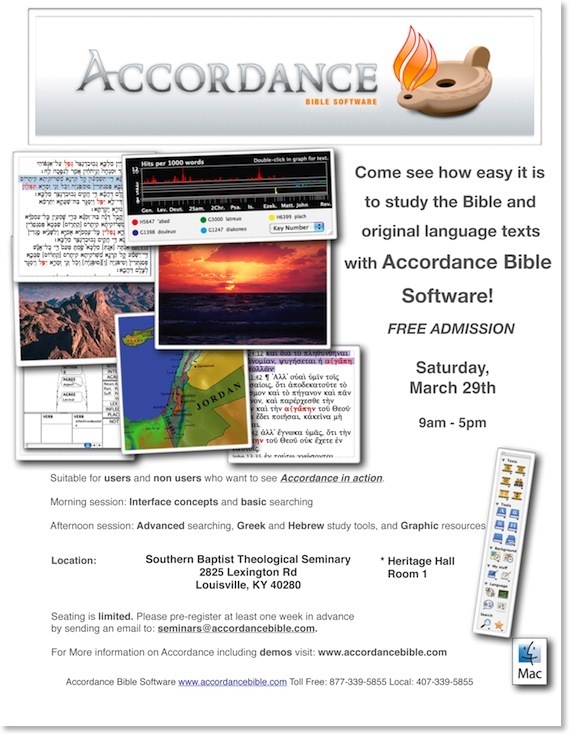The Orthodox Study Bible (A Guest Review)
The Orthodox Study Bible
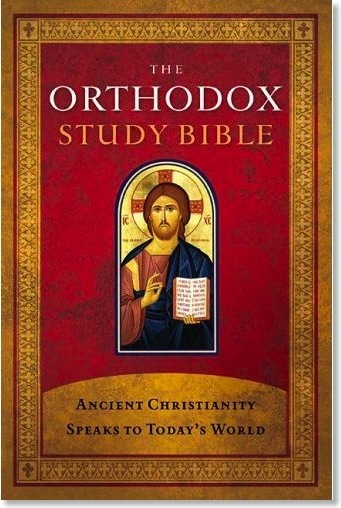
I was fortunate enough to participate with some of the translation of the LXX text, so let me briefly cover the translation methodology that was used. This is not a wholly fresh translation, but will follow the NKJV translation tradition, except for the “Greek” books. This is for at least two reasons. First, it will keep a consistent NKJV flavor found in the New Testament. This is important for us, because so much of this will be read liturgically and therefore the sound of the text matters. Second, there are production issues. Apparently producing a completely fresh translation on a large scale is very costly. Revisions are cheaper, and in many ways this will be a revision of the NKJV. Therefore, the methodology used was to change the NKJV text only where it deviated from the LXX. As a translator this was difficult, and required a lot of restraint. At times, I felt I could phrase a passage better than the NKJV, but unless it changed the meaning I tended to leave it alone. This probably points to a third reason for using this method. It makes the editorial process much quicker. The editors had to spend their time on much fewer words than in full blown translation.
Only recently has LXX translations come into vogue. Yet, the ones that are available are not available on a widespread basis, so this will be the first popular English translation of the LXX to be published by a major American Bible publisher. In fact, the last time this was done was by Lancelot Brenton in 1851. Why is this necessary or important? For Orthodox this is an easy answer---it is our official OT text. To explain the value to other Christian groups, a little background on the LXX is needed. After the Jews became scattered due to the Babylonian captivity and other conquests of Israel, many Jews were unable to read Hebrew. Greek had become the language of the Jewish Diaspora. In order to retain Biblical literacy among Judaism, Jewish scholars in Alexandria from approx. 3rd-1st century BC decided to translate their Hebrew Bible into Greek. Traditionally 72 scholars worked on the project which if you round down to 70 you get the name of the translation--the Septuagint (LXX). The LXX gained widespread use throughout the Diaspora and even in Jerusalem. The Jewish scholars Philo and Josephus seem to rely on the LXX when they quote the OT. For Christians, the importance came during the construction of the NT. A simple cross reference of OT quotations in the NT will show their divergence from the Masoretic text in places. In fact, the Apostles quote most often from the LXX rather than a Hebrew version. When looking at the more complete OT quotations in the NT nearly one hundred agree with the LXX and six agree with the Masoretic Text. What makes this more significant is that most of these quotes deal with prophecies concerning Christ. As a result, the LXX became the Bible of the early church, and has continued to be the OT of the Orthodox Church. The Jews of the 2nd century eventually dropped the use of the LXX. There are probably many reasons for this, but a prime reason was that Christianity had embraced its use and they needed to distance themselves from their rival religion. Also, our oldest extant manuscripts of the OT are from the LXX (4th century AD) and the oldest complete Hebrew OT (Leningrad Codex) was copied around 1000 AD. For these reasons it is important that Christians today can read the Bible used by the Apostles to spread the Gospel throughout the Roman world.
As a side note, there is a tradition regarding the translation that is too fascinating not to mention. The tradition revolves are the person of the righteous Simeon who received the infant Christ as His presentation in the Temple. According to this tradition he was the LXX translator of Isaiah. This would have made him around 200 years. Apparently when he was translating Isaiah 7:14 he debated over whether to translate "almah" with the Greek for virgin or young woman. Virgin seemed impossible to him, so he was about to write young woman and an angel stopped his hand. The angel told him to use virgin, and to confirm the truth of the word choice the righteous Simeon would live to see the fulfillment. This definitely gives a unique perspective on Simeon's words "now let your servant depart in peace" (Luke 2:29).
Now for the review of the Bible. Let me give some basic features of this Bible that make it unique beyond the translation, then follow with a brief evaluation of positive elements and elements that could be improved or revised in future editions. One of the more immediate differences one will notice is the order of the OT books. The "Greek" books are integrated into the contents rather than separated out in an Aprocryphal setting. Here is the list of books: Genesis, Exodus, Leviticus, Numbers, Deuteronomy, Joshua, Judges, Ruth, 1 Kingdoms, 2 Kingdoms, 3 Kingdoms, 4 Kingdoms, 1 & 2 Chronicles, 1 & 2 Ezra, Nehemiah, Tobit, Judith, 1,2,&3 Maccabees, Psalms, Job, Proverbs, Ecclesiastes, Song of Songs, Wisdom of Solomon, Wisdom of Sirach, Hosea, Amos, Micah, Joel, Obadiah, Jonah, Nahum, Habakkuk, Zephaniah, Haggai, Zechariah, Malachi, Isaiah, Jeremiah, Baruch, Lamentations, Epistle of Jeremiah, Ezekiel, Daniel. Yes, its going to take a while to find verses quickly because of the different ordering. One of the surprises is that the editors chose to use the common English names of the books rather than their Greek equivalent, except in the case of Kingdoms. For example, Jonah would have been Jonas, Ezra would be Esdras, etc. However 1 & 2 Kingdoms is called 1 & 2 Samuel in modern English translations. The editors stayed with this same name and place format throughout the translation. I think this was helpful rather than having to relearn names. Even though most could figure out that Elias is Elijah, it could create confusion for Bible newbies.
The Psalter includes Psalm 151 and uses the LXX numbering rather than the Masoretic. However, the Hebrew numbering is placed in parantheses when different. One reviewer has complained about the versification. In most cases this will match the Hebrew version, although there are places where there are more verses than the Hebrew has and often these are inserted in the midst of chapters. Other versions of the LXX have left out the verse numbers in these places or divided it out using letters such as 11a, 11b, 11c, etc. In those places the editors chose to create their own system of versification, which may cause some confusing when comparing LXX to Hebrew passages.
Being a study Bible, it does contain notes at the bottom of each page which is helpful. I found them not to be overwhelming and in the most cases very helpful. The vast majority of notes are direct comments from the Church Fathers. This is a feature that could be beneficial to non Orthodox Christians. Among modern Christians the voice of the Fathers regarding Scripture is unknown, so it is nice to see what John Chrysostom says versus C.I. Scofield. Other notes tend to have a Christological or Trinitarian emphasis. Also interspersed throughout the Bible are various articles and 21 of the articles are specific to OT themes such as Theophanies of Christ, Ancestral Sin, Christ our Passover, etc. Also at the bottom of each page, a text is noted if used liturgically in the Orthodox church. This my not be useful to non-Orthodox, but for Orthodox it provides a nice context to how the Church understands a particular passage.
Overall, I am very pleased with the outcome of the text, and I think it is a welcome addition to English Bibles and can be a great benefit to non-Orthodox believers as well.
The Orthodox Study Bible is available in hardcover and bonded leather. It runs 1,822 pages and is roughly an inch and a half thick. It can be pre-ordered from most retail outlets.
Theron can be reached at mathis5fam@yahoo.com, and be sure to join the discussion in the comments section.
Larry Norman (4/8/47 - 2/24/08)
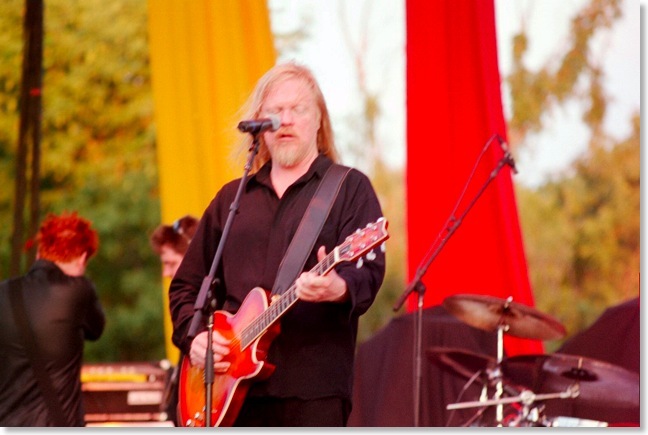
I was sad to receive word yesterday on the theophilusj Yahoo group that Larry Norman passed away on Sunday.
Here is the statement that was in the message and can also be seen on Larry Norman's website:
Hello everybody.
Our friend and my wonderful brother Larry passed away at 2:45 Sunday morning. Kristin and I were with him, holding his hands and sitting in bed with him when his heart finally slowed to a stop. We spent this past week laughing, singing, and praying with him, and all the while he had us taking notes on new song ideas and instructions on how to continue his ministry and art.
Several of his friends got to come and visit with him in the last couple of weeks and were a great source of help and friendship to Larry. Ray Sievers, Derek Robertson, Mike Makinster, Tim and Christine Gilman, Matt and Becky Simmons, Kerry Hopkins, Allen Fleming and a few more. Thank you guys. Larry appreciated your visits very much. And he greatly appreciated the thoughts, wishes, support and prayers that came from all of you Solid Rock friends on a daily basis. Thank you for being part of his small circle of friends over the years. Yesterday afternoon he knew he was going to go home to God very soon and he dictated the following message to you while his friend Allen Fleming typed these words into Larry's computer:
________________________________
I feel like a prize in a box of cracker jacks with God's hand reaching down to pick me up. I have been under medical care for months. My wounds are getting bigger. I have trouble breathing. I am ready to fly home.
My brother Charles is right, I won't be here much longer. I can't do anything about it. My heart is too weak. I want to say goodbye to everyone. In the past you have generously supported me with prayer and finance and we will probably still need financial help.
My plan is to be buried in a simple pine box with some flowers inside. But still it will be costly because of funeral arrangement, transportation to the gravesite, entombment, coordination, legal papers etc. However money is not really what I need, I want to say I love you.
I'd like to push back the darkness with my bravest effort. There will be a funeral posted here on the website, in case some of you want to attend. We are not sure of the date when I will die. Goodbye, farewell, we will meet again.
Goodbye, farewell, we'll meet again
Somewhere beyond the sky.
I pray that you will stay with God
Goodbye, my friends, goodbye.
Larry
________________________________
Thank you to all of you who were so nice to my brother over the years. Kristin and I will post funeral information in the next day or two. Right now we're not able to function very well, but the whole family is here... our mother Margaret, our sisters Nancy and Kristy, Mike Norman and his new wife Tiffany, and Silver.
We miss him beyond words. Thank you for everything.
Peace to you all in Christ,
Charles Norman
The picture at the top of this post was either taken at the 2001 Cornerstone Festival in Bushnell, Illinois (see other pictures here). I should say that I rarely (maybe never) listen to any current selections of so-called contemporary Christian music--at least the kind that would be played on the radio or featured in Christian stores. But that's not to say that I don't appreciate non-traditional Christian music. When I've had a chance in the past, I've made it to the Cornerstone Festival, listened around in the tents for music that caught my interest and purchased CDs accordingly. And I've been fortunate to have seen Larry Norman perform a handful of times at those festivals.
If you don't know who he is, it's truly a shame (you can always read his Wikipedia entry, I suppose). Very few people warrant titles like "father of" or "pioneer" in their chosen field. Those who did know him and the significance of his loss Sunday, at the same time know his place is secure in the presence of God with his passing.
The San Jose Mercury News website ran a story about Larry's influence and death this morning, an overflow of information the writer had collected for his obituary. Frank Black of the Pixies is quoted in the article as saying of Larry Norman, "You know, I never met Jesus Christ, but he actually seems Christlike." That's not a bad way to be remembered, and especially to have it reported in the secular press.
I first discovered Larry Norman's music while in college when my friend Stan Gaulden played Norman and others on our campus radio station on Sunday mornings. It was simply called "The Christian Show." But it was a state university and eventually the powers-that-be pulled the show. I wonder if all that classic Christian rock vinyl still sits in some back office of KLPI or if it was thrown out years ago?
Of course my college-era discovery of Larry Norman was a decade and a half after he had already made his mark in the history of Christian music. The cassettes I bought then eventually wore out, and I gradually replaced them with CD's picked up at the Cornerstone Fest. Larry's music style reflects the late sixties/early seventies style that produced it, and it's easy to forget how revolutionary it was for its time (or even much later when I first heard it). I've heard some of the remixes and I suppose new artists will forever release their versions of "Why Should the Devil Have All the Good Music?" and "I Wish We'd All Been Ready," but I prefer Larry's original versions, thank you very much.
And if the above songs are all you know of Larry's music, you should really pick up one or two of his CD's--especially one of his original "Trilogy" albums. Listening to Larry's music from the early seventies is quite different than some of the sterile "artificially sweet" stuff that passes for much of Christian music today. The Good News of Jesus Christ is always subversive to the values of the culture in which it's proclaimed, and the lyrics of Larry Norman's music reminds us that there are more social issues for Christianity to address than merely abortion and sexual orientation.
At the end of the Mercury News piece, Larry Norman is summed up (quoting Denny Fridkin) like this: "His ministry was really his music and his message was very simple: to love God and love your neighbor and help the poor."
Christlike indeed.
My Conversation with Kathy this Morning as We Were Getting Ready for Church

Kathy: Yes, I love you more today.
Me: Do you love me more today than you did last week?
Kathy: Yes, Rick. I love you more today than I did last week.
Me: Do you love more today than you did yesterday?
Kathy: (getting frustrated) Yes... I love you more today than even yesterday.
Me: Some days do you love me less than others?
Kathy: Sweetheart, I could not possibly love you any less than I do right now.
???
Baptism Anniversary
Queenie Pennington (1919 - 2008)
Queenie Pennington, 88, of Ruston, Louisiana, formerly of Malvern, Arkansas died Saturday, February 9, 2008.
She was born on October 12, 1919 in Manning, Arkansas. She was the daughter of the late John Nelson Amis and Fannie Irma Hood Amis.
Funeral services will be held at 2:00PM on February 11, 2008 in the Atkinson Funeral Home Chapel with her grandson, Rick Mansfield, officiating. Burial will follow in Resthaven Cemetery.
Queenie was a long time member of Taylor’s Chapel Missionary Baptist Church and a member of the Senior Ladies Sunday School Class. Having been raised in Sparkman, Arkansas, where she received her formal education, Queenie found great satisfaction as a homemaker in her adult life.
Survivors include her husband of 71 years, Edward Dale Pennington; two daughters, Margaret Sue Duty and husband Douglas of Benton, Louisiana; Barbara Ann Orren and husband, E.L.”Sonny” Orren of Ruston, Louisiana; one son, Charles Edward Pennington and wife, Dianne of Malvern, Arkansas; one sister, Ida Lou Ellis Heard and husband, Dale of Camden, Arkansas.; grandchildren Debbie Jayroe of Benton, Louisiana, Cindy Selmer of Shreveport, Louisiana; Richard Fowler Mansfield, Jr. of Simpsonville, Kentucky; Rodney Pennington of Hot Springs, Arkansas; Angela Bevill of Hot Springs, Arkansas; Brandy Richards of Foley, Alabama, Jody Dickson of Jessieville, Arkansas and Jeremy McInroe of Malvern, Arkansas; twenty-one great grandchildren and three great-great-grandchildren.
She was preceded in death by her parents; two step-mothers, Blanche Crossley Amis and Daisy Parker Bettis Amis; three brothers, Homer, Harvey, and Marshall Amis; one sister, Esther Ora Tabor and one grandson, Rusty Pennington.
Pallbearers; Frank Burton, Merle Jordan, Carl Robbins, Orman Wallace, Henry Holt and Travis Pennington
Honorary Pallbearers; Ollie Caldwell and Jim Ledbetter
Memorials may be made to Taylor’s Chapel Missionary Baptist Church, 29966, Hwy. 67, Malvern Arkansas 72104, Temple Baptist Church of Ruston or charity of donor’s choice.
Visitation will be from 1:00PM until service.
Special thanks to Dr. Ed Mariano of Green Clinic in Ruston and Dr. Ray Bollen of Malvern for their kind, compassionate care.
CT "Future" Article Now Online

Chris Armstrong, the writer of the article is spot-on correct in regard to the "identity crisis" among Evangelical/Prostestant Christianity. I've been reflecting on this for a while, and I'm glad to see similar echoes such as what is written about in the article. I don't know if the future lies completely in the past, but recapturing Christian heritage over and above the Next Big Thing (NBT) in pop-spirituality is a good start.
The NASB & the Rejection of Markan Priority
Markan priority--the idea Matthew and Luke independently used Mark's gospel as a starting point, along with the so-called Q source and their own independent traditions--is almost universally accepted in biblical scholarship across almost all theological persuasions.
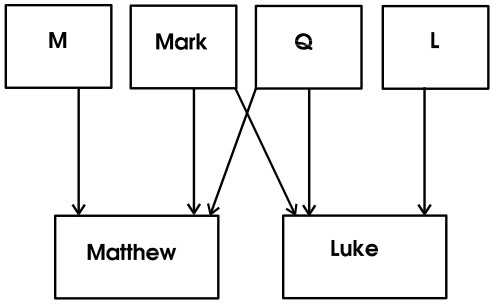
Consider the late F. F. Bruce on the subject in his article on the Gospels in The New Bible Dictionary:
This finding [the idea of Markan priority], which is commonly said to have been placed on a stable basis by C. Lachmann in 1835, depends not merely on the formal evidence that Matthew and Mark sometimes agree in order against Luke; Mark and Luke more frequently against Matthew; but Matthew and Luke never against Mark (which could be explained otherwise), but rather on the detailed comparative examination of the way in which common material is reproduced in the three Gospels, section by section. In the overwhelming majority of sections the situation can best be understood if Mark’s account was used as a source by one or both of the others. Few have ever considered Luke as a possible source of the other two, but the view that Mark is an abridgment of Matthew was held for a long time, largely through the influence of Augustine. But where Matthew and Mark have material in common Mark is fuller than Matthew, and by no means an abridgment; and time after time the two parallel accounts can be much better explained by supposing that Matthew condenses Mark than by supposing that Mark amplifies Matthew. While Matthew and Luke never agree in order against Mark, they do occasionally exhibit verbal agreement against him, but such instances mainly represent grammatical or stylistic improvements of Mark, and are neither numerous nor significant enough to be offset against the general weight of the evidence for Mark’s priority.
In seeking to confirm Wilkin's statements from 1995, I have been in correspondence with a person at the Lockman Foundation over the past couple of weeks in regard to this subject. Although I was not given permission to quote any of the statements from the representative of the Foundation as they consider them private correspondence only to me, I am allowed to confirm that the rejection of Markan priority is indeed a conviction on the part of the NASB translators.
What difference would it make whether a translator holds to Markan priority or not? Well, I have to walk a bit of a discretionary tightrope here regarding the exact nature of the explanation given to me by the representative of the Lockman Foundation. Suffice it to say, at the very least, it involves (according to them) how a translator might view parallel accounts between the synoptics that contain conflicting information. Are they the same event with actual conflicting details or are they two separate, but similar events? This, evidently, is the issue to the translators. Also, there is concern on the translators part that adherence to Markan priority may affect one's view of inspiration. I can't say much more than that as I may have already relayed more than what is appropriate in the request given to me for confidentiality, although I have attempted to be vague in the statements immediately above. I wish I could be more specific regarding the explanation given to me by the Lockman Foundation.
But I have a few questions for the readers of This Lamp. (1) Am I late to this information, or has anyone else ever heard of the rejection of Markan Priority by the NASB translators? (2) Granted the early church held to a position of Matthean priority, but as far as I know, most biblical scholarship--including Evangelical scholarship--rejects the traditional position in favor of Markan priority. Therefore, how widespread is a rejection of of Markan priority among respected scholarship? (3) As I look at the list of other translators for versions such as the ESV, NLT, TNIV, NET, HCSB, etc., I cannot imagine a unanimous rejection of Markan priority on any of these other committees. Am I simply mistaken? And finally and most importantly, (4) would acceptance or rejection of something like Markan priority truly make a difference in the accurate translation of the Synoptic gospels? Would not an honest translator simply render the text as it is?
For the record, I believe Markan priority is the best offered explanation of the so-called synoptic problem. Frankly, I'm surprised that the entire committee of a modern translation would have unanimous and wholesale rejection of it. Your thoughts are welcome and encouraged in the comments.
Guest Review: The Bible Experience Companion Bible
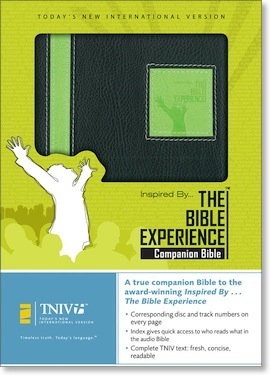
Being my first TNIV purchase I mainly picked up The Bible Experience Companion Bible because it had (IMO) the best looking cover of all the Thinline versions. Hey, I'm a 20-something year-old youth pastor. It matters.
[I wouldn't recommend reading along while listening to the Bible Experience. Since your eyes take in the words faster than they're reading, it "feels" like they're reading it very slow.]
I also appreciate that the Companion Bible comes with a written intro as to how the Bible Experience project came about. I like the thorough listing of who read what part -- the Talent Index. The pro's of this feature is that if I want to quickly locate a Psalm or a Proverb read by my favorite preacher, I can quickly find it. The downside? I don't want to know that it's Cedric the Entertainer reading a part, because it makes me ROFL and I have trouble suspending my disbelief. Same goes with Samuel L. Jackson. Yeah, remember his Scripture-quoting-hit-man in "Pulp Fiction" ?
I guess the only thing missing from this Bible is that the Talent Index replaces your traditional Concordance. But, hey, that's what you have the Internet for, right?
One final observation: In all my previous Bibles, the scripture printed on the Dedication Page has been "The flowers fade and the grass withers, but the word of the Lord stands forever." In this Bible it is: "Go, and make disciples of all nations." Any observations? Is it a recognition of the shifting motives of the new generation, who are more likely to engage with a Cause rather than a Study? The first quotation has a sense of tradition, and Bible-study, etc. While the latter has a ring of action and a call to adventure. I would love to hear people's thoughts on this blog.
Thanks to Rick for inviting me to write a guest blog. And most of all for kindly answering my questions about the TNIV so that I could make the wise choice. I can now say that I'm an NIV-to-NASB-to-ESV-to-TNIV "convert." You could say, I've come full circle.
- R.S., Los Angeles, CA
Related Reviews:
- The Bible Experience: Pentateuch
- The Bible Experience: Historical Books
Nifty [Stupid] Leopard Tricks: Screen Sharing to Infinity
I carry most of my current work on my MacBook, but occasionally when I'm working at home, I prefer to use the iMac and simply start up a screen-sharing session back to my MacBook. So recently, I wondered what would happen if I started up a screen share on each Mac to the other Mac. Here is my result (click on the image to see a larger version):

All-Day Accordance Seminar To Be Held at SBTS
For more information, click on the image below or click here for a PDF copy.
